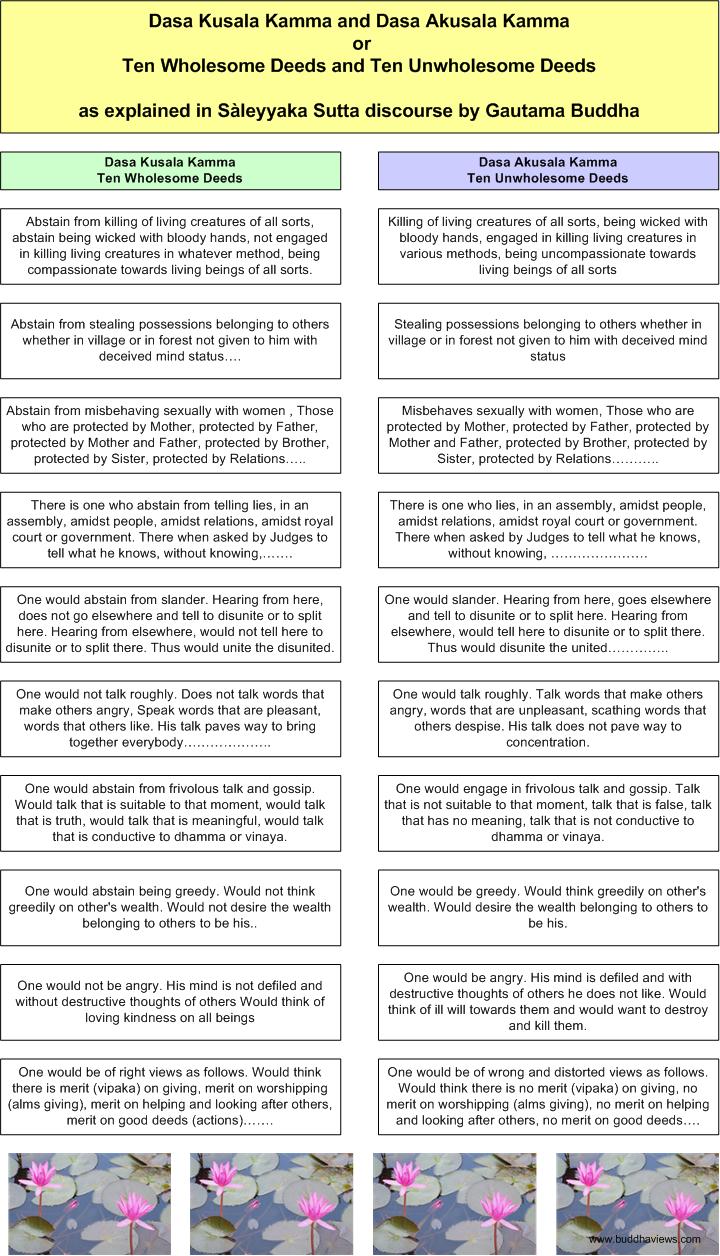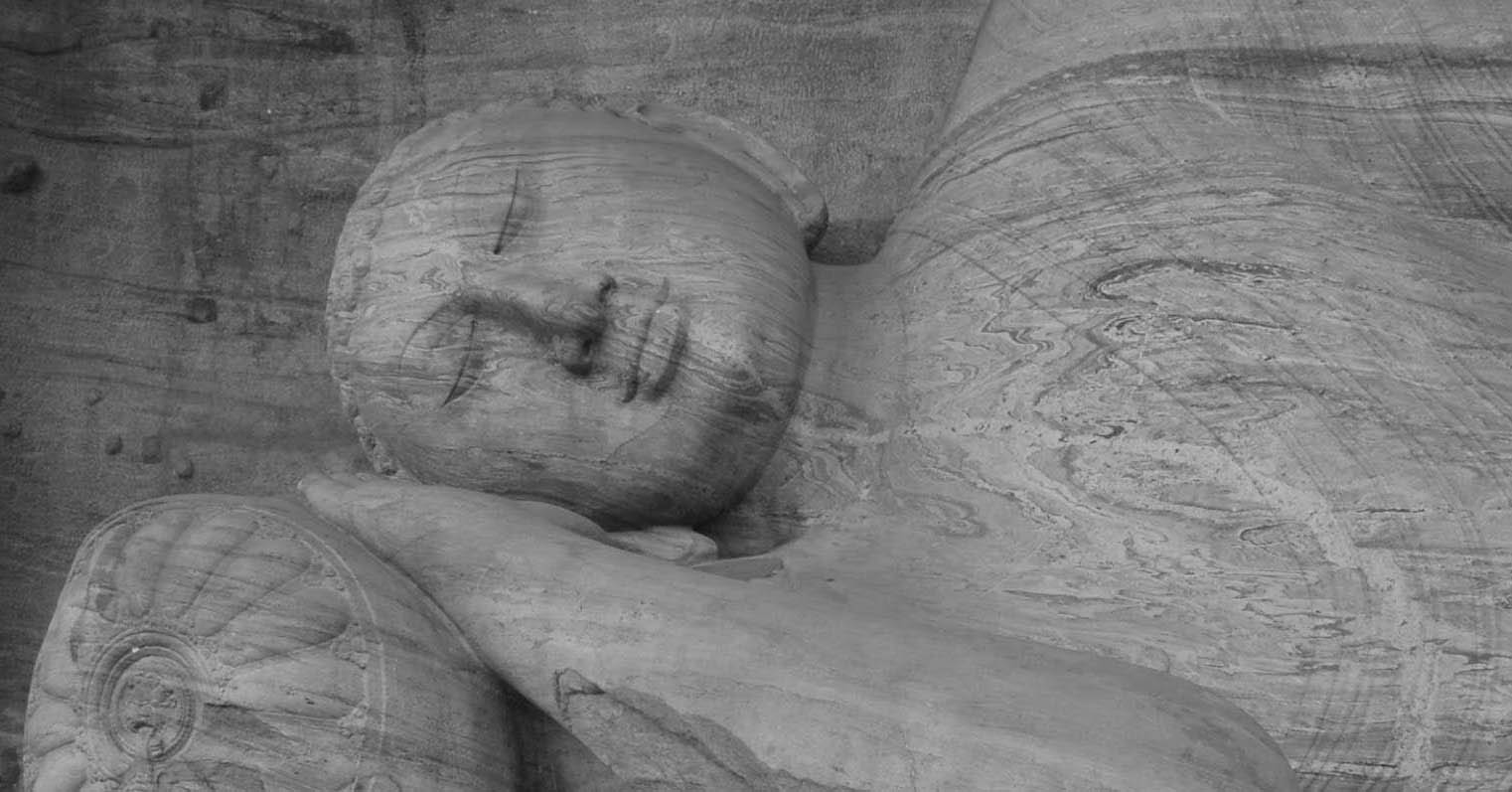-
Gautama Buddha's Simile of "Plantain tree" for Mental-formations
The five aggrigates
-
Gautama Buddha's Simile of "magical illusion" for Consciousness
The five aggrigates
Learning Dhamma
Dasa Kusala Kamma - Dasa Akusala Kamma
Dasa Kusala Kamma and Dasa Akusala Kamma or Ten Wholesome Deeds and Ten Unwholesome Deeds
==

දස කුසල සහ දස අකුසල




Dasa Kusala Kamma and Dasa Akusala Kamma Explained
දස කුසල සහ දස අකුසල
Dasa
Kusala is known as Ten Wholesome Deeds (Action) or Ten Meritorious Deeds
and Dasa Akusala is known as Ten Unwholesome Deeds or Ten Immoral Deeds.
Deeds and Action can be considered to give the same meaning here.
Saleyyaka Sutta discourse, disclosed by Gautama Buddha at Sala
village of Kosala kingdom, describes one of the most important points
of the Buddha Dhamma, namely Dasa Kusala Kamma ( Ten Wholesome Deeds)
and Dasa Akusala Kamma ( Ten Unwholesome Deeds). The essence of the Sutta
describing Kusala and Akusala kamma can be put forward as follows.
Dasa Akusala Kamma or Ten Unwholesome Deeds or Actions
There
are three ( 3 ) types of Wrong Conduct a human being is capable of.
(1) Wrong Conduct with Body
(2) Wrong Conduct with Words
(3) Wrong Conduct with Mind
There are three (3) sub divisions of Wrong Conduct with Body
(1.1)
Killing of living creatures of all sorts, being wicked with bloody hands,
engaged in killing living creatures in various methods, being uncompassionate
towards living beings of all sorts
(1.2)
Stealing possessions belonging to others whether in village or in forest
not given to him with deceived mind status
(1.3)
Misbehaves sexually with women, Those who are protected by Mother, protected
by Father, protected by Mother and Father, protected by Brother, protected
by Sister, protected by Relations, protected by the Clan, protected by
Dhamma, those having a Husband, those consented for marriage, those who
are promised for marriage in whatever way.
There
are four (4) sub divisions of Wrong Conduct with Words.
(2.1)There
is one who lies, in an assembly, amidst people, amidst relations, amidst
royal court or government. There when asked by Judges to tell what he
knows, without knowing, he would say that he knows, with knowing, would
say that he does not know. Without seeing, would say that he saw and seeing
would say that he did not see. As mentioned he would lie knowingly due
to self benefit, or due to influence of others or due to a bribe or a
reward offered.
(2.2)
One would slander. Hearing from here, goes elsewhere and tell to disunite
or to split here. Hearing from elsewhere, would tell here to disunite
or to split there. Thus would disunite the united. Would separate out
the split ones. Take pleasure on creating split up groups , would speak
to create such split up groups.
(2.3)
One would talk roughly. Talk words that make others angry, words that
are unpleasant, scathing words that others despise. His talk does not
pave way to concentration.
(2.4)
One would engage in frivolous talk and gossip. Talk that is not suitable
to that moment, talk that is false, talk that has no meaning, talk that
is not conductive to dhamma or vinaya.
There are three (3) sub divisions of Wrong Conduct with Mind.
(3.1)
One would be greedy. Would think greedily on other's wealth. Would desire
the wealth belonging to others to be his.
(3.2)
One would be angry. His mind is defiled and with destructive thoughts
of others he does not like. Would think of ill will towards them and would
want to destroy and kill them.
(3.3)
One would be of wrong and distorted views as follows.
Would think there
is no merit (vipaka) on giving
no merit on worshipping (alms giving)
no merit on helping and looking after others
no merit on good deeds (actions)
or bad deeds ( kusala kamma and akusala kamma)
there isn't a thing called
present world
there isn't a thing called world after death
thinks there
is no specialty in Mother
thinks there is no specialty in Father
do
not believe in spontaneous births of beings ( birth in hell, heaven etc)
do not believe in recluses and brahmins who has gained wisdom that had
enabled them to gain inpaths to see this world and the other worlds.
Gautama
Buddha further says that due to above mentioned Wrong Conducts, some born
in hell after death.
Dasa
Kusala or Ten Wholesome Deeds or Actions
There
are three ( 3 ) types of Right Conduct a human being is capable of.
(1) Right Conduct with Body
(2) Right Conduct with Words
(3) Right Conduct with Mind
There
are three (3) sub divisions of Right Conduct with Body
(1.1)
Abstain from killing of living creatures of all sorts, abstain being wicked
with bloody hands, not engaged in killing living creatures in whatever
method, being compassionate towards living beings of all sorts
(1.2)
Abstain from stealing possessions belonging to others whether in village
or in forest not given to him with deceived mind status
(1.3)
Abstain from misbehaving sexually with women , Those who are protected
by Mother, protected by Father, protected by Mother and Father, protected
by Brother, protected by Sister, protected by Relations, protected by
the Clan, protected by Dhamma, those having a Husband, those consented
for marriage, those who are promised for marriage on a future day in whatever
way ( by garlanding etc).
There
are four (4) sub divisions of Right Conduct with Words.
(2.1)There
is one who abstain from telling lies, in an assembly, amidst people, amidst
relations, amidst royal court or government. There when asked by Judges
to tell what he knows, without knowing, he would say that he don't know,
with knowing, would say that he does know. Without seeing, would say that
he did not see and seeing would say that he saw. As mentioned he would
not lie knowingly even due to self benefit, or due to influence of others
or due to a bribe or a reward offered.
(2.2)
One would abstain from slander. Hearing from here, does not go elsewhere
and tell to disunite or to split here. Hearing from elsewhere, would not
tell here to disunite or to split there. Thus would unite the disunited.
Would bring together the split ones. Take pleasure on uniting up groups
, would speak to create unity among groups.
(2.3)
One would not talk roughly. Does not talk words that make others angry,
Speak words that are pleasant, words that others like. His talk paves
way to bring together everybody.
(2.4)One
would abstain from frivolous talk and gossip. Would talk that is suitable
to that moment, would talk that is truth, would talk that is meaningful,
would talk that is conductive to dhamma or vinaya.
There are three (3) sub divisions of Correct Conduct with Mind.
(3.1)
One would abstain being greedy. Would not think greedily on other's wealth.
Would not desire the wealth belonging to others to be his.
(3.2)
One would not be angry. His mind is not defiled and without destructive
thoughts of others Would think of loving kindness on all beings.
(3.3)
One would be of right views as follows.
Would think there is
merit (vipaka)
on giving
merit on worshipping (alms giving)
merit on helping and looking
after others
merit on good deeds (actions) or bad deeds ( kusala kamma
and akusala kamma)
there is a thing called present world
there is a
thing called world after death
thinks there is specialty in Mother
thinks
there is specialty in Father
do believe in spontaneous births of beings
( birth in hell, heaven etc)
do believe in recluses and brahmins who
has gained wisdom that had enabled them to gain inpaths to see this world
and the other worlds.
Gautama
Buddha says that due to above mentioned Right Conducts, some born in heaven
after death.
Comments
Since Dhamma is Opanaiko, meaning we have to realise
it ourselves by usage or practicing, it is prudent for the Dhamma
learner to inquire the Dhamma contents thoroughly to use it in daily
living.
The descriptions in Dhamma nearly 2600 years back still is viable
and applicable to our lives. For instant we can apply the ten Unwholesome
deeds to the present day actions.
The
immoral actions described in the previous postTen Immoral
Actions (Dasa Akusala) are the ones that accrue bad
kamma and will bring bad resultsincluding
rebirth in the lower four realms.
These
are called ten immoral acts (dasa akusala). The ten immoral acts
are divided into the three categories as follows:
Abstain from killing of living creatures of all sorts, abstain being
wicked with bloody hands, not engaged in killing living creatures
in whatever method, being compassionate towards living beings of
all sorts
Realising
the above we need to refrain from killing any living being. Today
many are involved in professions that destroy and kills either people,
animal, or creatures. Making weapons of destruction also is bad.
Once you know the bad outcome from such, one need to shift away
from such action and need to find a more harmless type of a profession
for making a living.
Abstain from stealing possessions belonging to others whether in
village or in forest not given to him with deceived mind status
This
is more wide spread today and come to the fore in a disguise that
looks like a harmless thing. Administrators and large business enterprises
of powerful countries take resources of the poor countries by numerous
ways without any guilty feeling that is considered to be a norm
in the world today. Many companies make large profits by burdening
the consumers with out any pity on them. Governments and influential
people use and spend government revenue for their own use from the
funds collected from the people of the country. All these and more
actions around us also gets qualified to call as stealing. One should
think whether he is engaged in such actions.
Abstain from misbehaving sexually with women ,Those who are protected
by Mother, protected by Father, protected by Mother and Father,
protected by Brother, protected by Sister, protected by Relations,
protected by the Clan, protected by Dhamma, those having a Husband,
those consented for marriage, those who are promised for marriage
on a future day in whatever way ( by garlanding etc).
Here
Lord Buddha has well detailed how a house holder or a layman should
behave in good conduct with the women. Though the sutta describes
upon misconduct of a man, for women also it needs to be applied
preferably in the following manner.
Misbehaves sexually with men .Those who are protected by Mother,
protected by Father, protected by Mother and Father, protected by
Brother, protected by Sister, protected by Relations, protected
by the Clan, protected by Dhamma, those having a Husband, those
consented for marriage, those who are promised for marriage in whatever
way.
Today
the culture of many countries facilitate sexual misbehavior so vast
majority is ignorant on the bad effects on such unwholesome action.
The protection will only be there for those who refrain from such
low activities.
The
other seven Wrong Conducts are not difficult to understand other
than the Wrong View. This has some depth in each item. For instant,
the Mother facilitated for a person to be born as a human by letting
him accommodated in her womb in an minuscule egg at the beginning
of the life, nourishing for 9 months, with love and affection. Then
once he or she was born, looked after for many years until he was
able to do things in his own. One simply will not be able to state
all the things a mother had done to bring up a child to this world
as a healthy individual, making the ability to speak the mother
tongue!
As
for the Father, how would one be born as a human unless the father
did not facilitate to have his sperm come together with the Mother's
egg to facilitate the environment to have a human being born. Then
to upbring a child, how much the Father needed to find resources
for the upbringing of a child for so many years.
Gautama
Buddha gave such a prominence to Mother and Father , he consented
to call them as Brahmas since the Parents are such benevolent to
a person. Thus there are benevolent results for those who look after
the well being of mother and father and adverse results for those
who neglect to look after the well being of mother and father.
Instant
Birth cannot be fathomed by the lesser but unless one has the acceptance
of the fact told by the greatest teacher Gautama Buddha, one will
not come into Right View. This is a very important factor since
Hell and Heaven play a major role in Samsara or the continuous cycle
of birth and death. It is to the cessation of this vicious cycle
of birth and death, Gautama Buddha aimed all his sermons for his
disciples to gain wisdom to become enlightened or to attend the
state of Nibbana.
o
Dasa Kusala Akusala Diagram

Saleyyaka Sutta-sinhala Pali



















